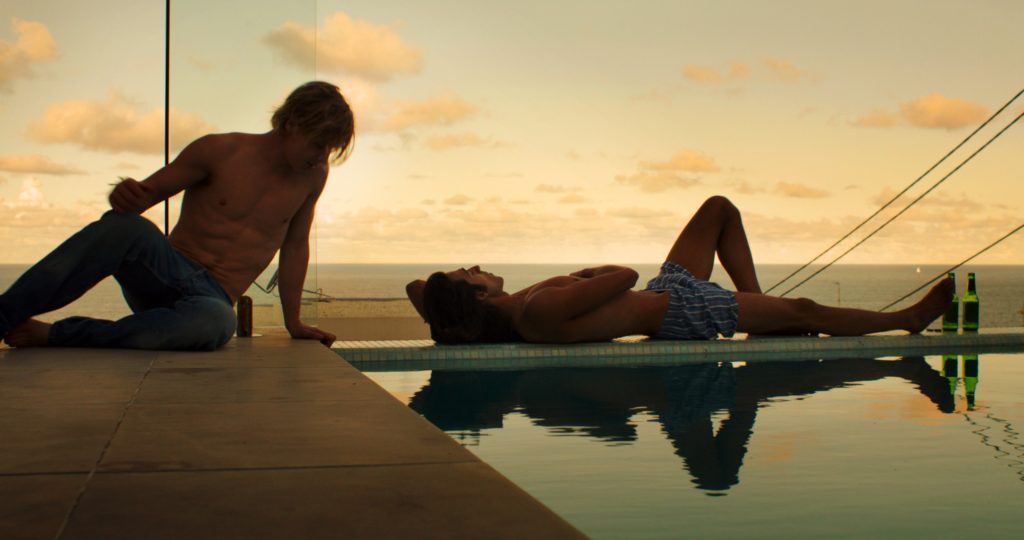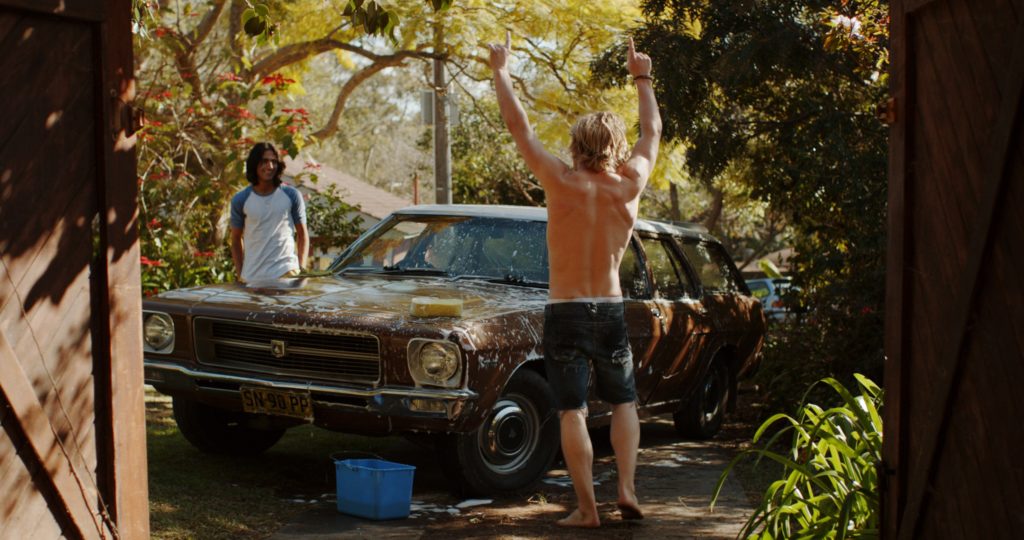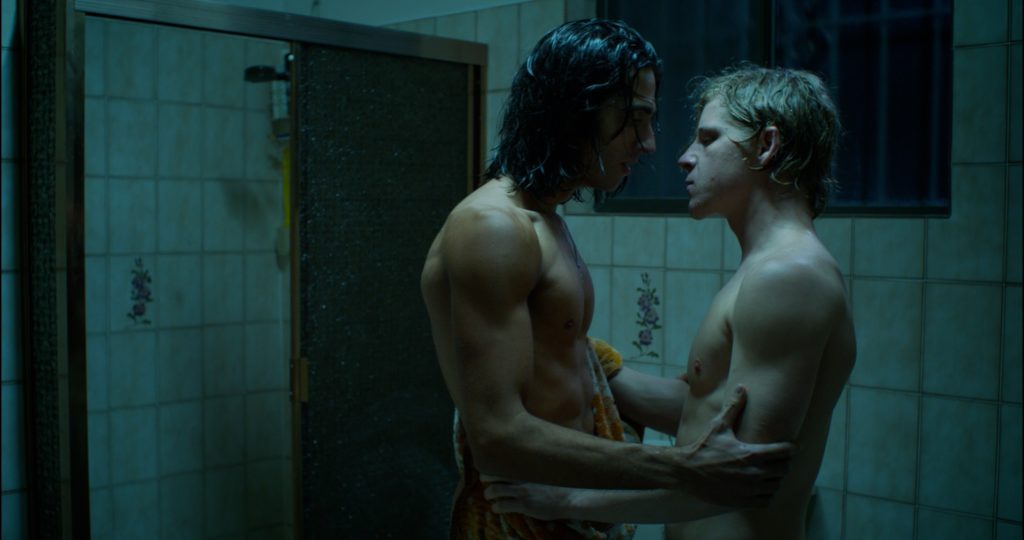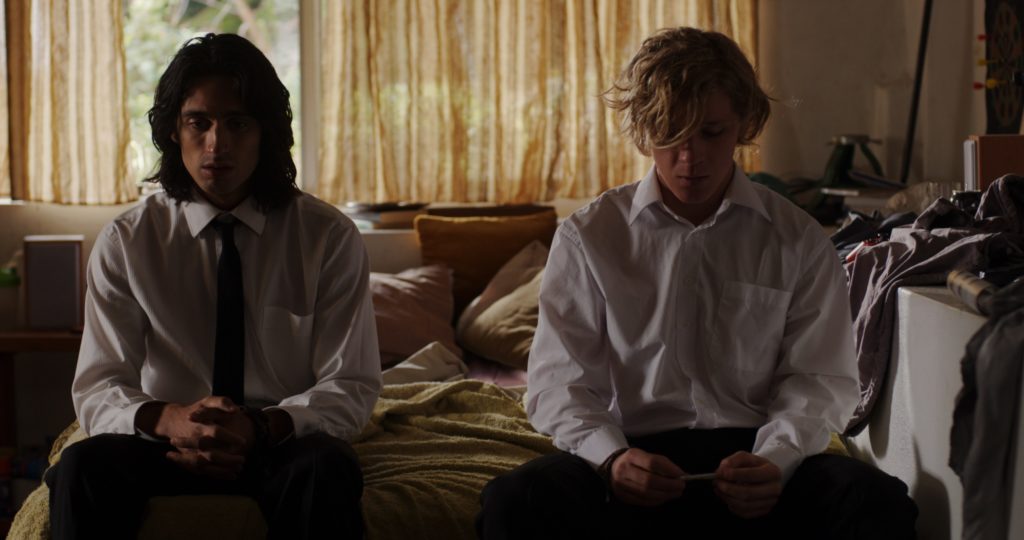Kena (16) chatted with Craig Boreham, director of Teenage Kicks screening at the Mardi Gras Film Festival and around Australia.
First of all, congratulations on Teenage Kicks – It’s an excellent new take on the classic coming-of-age genre, the energy in the audience felt whilst watching it was amazing. Could you tell me a bit about yourself, how did your film career begin?
It’s kinda convoluted actually, I came to filmmaking later. I had been working in theatre in props construction and the art department, and then I got into production design. I was going to study that. I’d just been to Sydney and I met a person who was studying at UTS and studying film and she was doing a documentary about an artist who was HIV positive and had AIDS and was dying. He was doing this big performance art piece and she was documenting it and I was pretty politically involved in the queer scene at that time – doing a lot of activist stuff – and it was amazing to me how the political voice and creative voices came together in that documentary. It completely inspired me. I thought it was really interesting. I planned to go to UTS as well as NIDA, and I got into UTS and thought, “Yes! This is it.”
When I saw Teenage Kicks, there was this onslaught of themes – we had maturation, school, family, sexuality, grief and death. Do you think that film could ever have a limit to how many themes are in it or do you think it adds to the layers and emotions in that film?
It depends on the story really, because I was looking at the story of a young person transitioning into young adulthood and it is such a time in your life where you do feel like so much stuff is thrown at you, and you have to do with a lot of new big things! Sometimes for the first time – by yourself – and that was why I thought that the onslaught worked for this film. I don’t know if it would work with every story, but something about that time in your life when new things happen all the time and everything tips on its head made it work.

Yeah, I’m quite familiar with it – it’s happening right now for me. So how long did the writing and shooting and post production take for the whole film, and did you think it would take that long?
I wrote the script straight up, it just came out like a big word vomit. It probably didn’t take that long, a month or two, and then it went into the drawer with all the other great ideas and I didn’t really think about it for a while. I had made another short that did really quite well and I got invited to submit a short script to a program in the US… but I didn’t have a short script ready so I put that script out and took a section of it and adapted it into a short self-contained story and that became the short film Drowning that we made some years ago. And that did really well, and we got a lot of responses from young people over the world saying that ‘we love this story’, ‘we want to know what happens’ and that kind of made us pull the script out again and I showed it to Annmarie, my producer, and she loved it straight up. So we decided to spend more time developing it and it changed quite a lot, and became the script for Teenage Kicks. We then spent probably a good couple of years raising finances for it – it’s a long process. The shoot itself was quite quick, about 5 weeks which is pretty standard but then the post production was really drawn out because it’s such a low budget film. We were taking, borrowing, stealing, as we spent a lot of time outside of other jobs in project so the post-production took a long time – good year or probably more with lots of breaks. If you compress all the time it’s probably pretty standard but because it was draw out in took a long time.

My favourite scene was probably the surfboard scene commemorating Tomi’s excellent drug quality. I absolutely love that scene – what was it like being on set and how did you film that? Because I remembered noticing that there was an angle below the water, in the water, at the water and above the water and I remember thinking how can you film at all in one go, as it was filmed in winter I assume that you would want to make it pretty quick.
We were only there for a day – we had one camera operator Rodger Buckingham who’s an amazing underwater cinematographer, and he came on board and did all the underwater stuff. Bonnie Elliott who is our D.O.P. for the rest of the film (she’s such an artist), she just worked her magic with the rest of it! We did a lot of stuff on the beach and then she ran on top of the cliffs and did some really wide shots on top of it. It was tricky though because it was filmed in the middle of winter, and so it was freezing with all the guys on surfboards freezing their asses off! They did have wetsuits on though so that’s good but it was pretty damn cold, so they couldn’t stay in the water all that long. We had to be pretty quick about it – like shooting an explosion: I was standing ready, and then “GO!” just one take. It’s beautiful there definitely worth the pain.

In the film, do you see yourself in your characters or do you take aspects from yourself to help write them?
There’s definitely bits of my own stuff in there. I think you’re always want to get inside their head so you have to have a way to attach yourself to the things that they want and what they’re fighting for. I guess there are little elements and ways I can relate to them, but then there’s also bits of stories I’ve heard from other people and their experiences that I’ve collected along the way, that formed those characters. It is total fiction – it’s not based on any real events just the elements that are parallel to my experiences or other people’s experiences. It’s a fictional story but I think you always draw upon yourself like actors do because they personalise their own emotional experience and put it into a character.
I just have to ask – where did the name of the film come from? Because I was doing my homework for this interview and I saw the band The Undertones and their album Teenage Kicks – is that related to the title of your film?
Yes, it is. They have a song called ‘Teenage Kicks’ that we took the title from and it’s a song about unrequited love and being a teenager and all of those things. I kind of liked it because it was little bit ironic, and it sounds really perky and poppy but it’s actually a really good brutal time and a brutal story. It kind of felt like teenagers being kicked in the head.
I definitely got that your feeling from your film more than any other film, especially in the coming of age genre. I really got the ‘raw-ness’ (is that a word?) from the film – it was very blunt and in your face but it worked that way.
Yeah, it’s kind of coming of age film but at the same time wanted to make it about the way people deal with grief and loss then sit that story on top of a classic coming-of-age world.

If you had to pick three films from your childhood or teenage years that influenced you as a teenager what would you pick?
Definitely Pretty in Pink by John Hughes with Molly Ringwald, it had a really great soundtrack, and then Heathers with Winona Ryder and Christian Slater and then later My Own Private Idaho by Gus Van Sant with River Phoenix and Keanu Reeves. That one was pretty pivotal for me and one of the first queer movies I ever saw.
All those John Hughes movies like Breakfast Club and Sixteen Candles, they really resonated with me and I think that we looked at those films when making Teenage Kicks (not like our film was anything like that) but elements of those films. We loved how those films always had a really interesting soundtrack and we wanted that in our film.
I read that you and your producer Annmarie Bell are whipping up something new… can you tell us anything about that or is it all hush hush?
I’m working with Annmarie and with a co-writer Adrian Chiarella – he was actually the editor on Teenage Kicks – but he’s also a writer. It’s a kind of a dark true crime story that’s based on real events. Quite a dark tale of sex and murder!
—
Catch Teenage Kicks on SBS Viceland in the Mardi Gras Movie season on Monday 27 Feb at 9:20pm then on SBS On Demand after the broadcast. See it on the big screen at Brisbane Queer Film Festival (15 March) or you can host your own local cinema screening with Fanforce.
Brisbane Queer Film Festival: http://www.bqff.com.au/films-teenage
